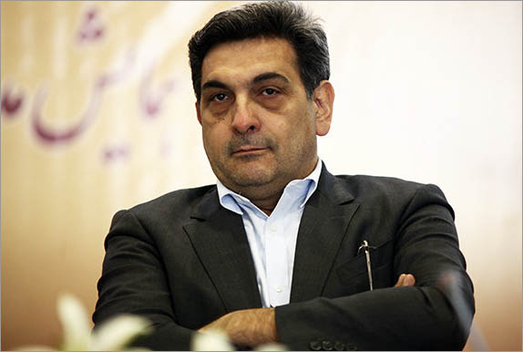 Pirouz Hanachi was narrowly elected mayor of Tehran last month by the capital’s city council, besting former roads and urban development minister Amir-Abbas Akhoundi by one vote—eleven to ten.
Pirouz Hanachi was narrowly elected mayor of Tehran last month by the capital’s city council, besting former roads and urban development minister Amir-Abbas Akhoundi by one vote—eleven to ten.
Hanachi replaces Mohammad Ali Afshani as the third mayor of the capital in the council’s current term. However, the Interior Ministry delayed accepting his election and officially ratifying it. This was due to the fact that the Intelligence Ministry did not swiftly approve Hanachi’s clearance for reasons that have not been disclosed.
The controversies revolving around the approval of Hanachi reflect ongoing political rivalry and friction between Iran’s reformist and conservative factions. Reformists took control of the city council in 2017 for the first time in more than a decade. Because of the centrality of Tehran, its mayoralty has often been a springboard to national power. Former President Mahmoud Ahmadinejad was previously mayor of Tehran and was followed by Mohammad Baqer Qalibaf, another presidential contender. Qalibaf lost to Hassan Rouhani in 2013.
The Interior Minister, Abdolreza Fazlollah Rahmani, ultimately ratified Hanachi’s appointment on November 28, the last day in which such action could legally be taken. An advisor to Rouhani, Hesamoddin Ashena, also supported Hanachi’s election on Twitter, while questioning some of his policies.
Hanachi had tweeted after the confirmation of his position that “he hopes to be serving the ‘people’ and ‘for God,’” referring to a chapter in the Quran calledNas or People. However, there is no such reference to serving the people in the chapter. Ashena, in a response to the tweet, asked: “Will we be witnessing a prosperous period of management where the city council and the new mayor would be cooperating with the government in serving the people without expectation?”
The delay in confirming the election was prolonged compared to the process of gaining clearance for previous mayors. According to Hasan Khalilabadi, a council member, the initial letter sent by the Intelligence Ministry regarding Hanachi’s qualifications was vague; hence there were lengthy negotiations between the Interior Ministry and the Intelligence Ministry to resolve the matter in Hanachi’s favor.
The lack of a clear explanation by the ministries over the appointment led to questions about the principles of “transparency” and “clarity”in the political system. There were concerns about why Hanachi initially was rejected and then finally approved. According to many analysts, there was a lack of will demonstrated by the Interior Ministry to strongly back Hanachi’s case. The delay also indicated a narrowing of the political arena for reformists by hardliners and conservatives.
A former head of the city council, Mehdi Chamran, who holds conservative views, warned that the conservative camp had not given up on running Tehran even thoughthe reformists won a majority in the city council elections. Chamran maintained that the conservatives had adopted more constructive policies in urban planning, traffic management and even with regard to selling building permits. He went so far as to accuse former reformist mayors of corruption and money laundering for allegedly selling such permits.
The Islamic City Council of Tehran and councils in other Iranian cities were created in 1999 by reformists to give the public more representation and encourage the growth of civil society. At the time, the president was Mohammad Khatami, who advocated freedom of speech and the press, political pluralism and tolerance. Ever since Khatami’s presidency, there has been a tendency to minimize central government interference in the city councils and to permit more open political expression in these forums. Thus, candidates with different backgrounds and newcomers to politics without factional affiliation have been able to enter the arena of city council competition. As a result, the elected members are seen as less reliable from the vantage point of certain factions and central institutions and this has led to tension at times.
The Hanachi election is not the only controversy regarding mayors in Iran. For example, Sepanta Niknam, a member of the city council in the central city of Yazd, who is Zoroastrian, was suspended from running for second term in office after a defeated rival challenged his candidacy. After much controversy, the case was referred to the Guardian Council, a cleric-dominated body which approves all candidates for elected office. The Guardian Council affirmed a ruling by the Administrative Court of Justice that suspended Niknam on the grounds that members of religious minorities should not represent towns with a Muslim majority.
Parliament moved to settle the issue by passing a bill with 152 votes in favor, which allowed the candidacy of religious minorities for city council elections. Finally, after the issue was referred to the Expediency Council, a body charged with resolving disputes among government branches, Ninkam was reinstated.
The current Tehran council has become a forum where more democratic ideas and policies can be discussed and disseminated. Composed of reformists who generally support the Rouhani administration, the council can play a role in reinforcing moderate policies. Hanachi, a graduate in architecture and restoration of urban areas, hopes to apply his expertise to resolving Tehran’s epic problems of traffic jams, pollution and illegal construction.
In an interview with Mehr New Agency, the new mayor said that compiling and implementing the Third Development program for Tehran is his top priority. In a meeting on Global Disability Day, he underlined the lack of attention to public services for people with disabilities and the necessity for further education and attention to this gap in Tehran. He referred to veterans of the Iran-Iraq War and the increased number of disabled people who need more services on a city level.
Tahereh Hadian-Jazy writes on women’s rights in Iran and the Middle East. She holds a Masters degree in modern Middle Eastern studies from Oxford University and has been accepted for a PhD at the University of St. Andrew.
Image: Pirouz Hanachi, Tehran's new mayor (Sarpoosh)

